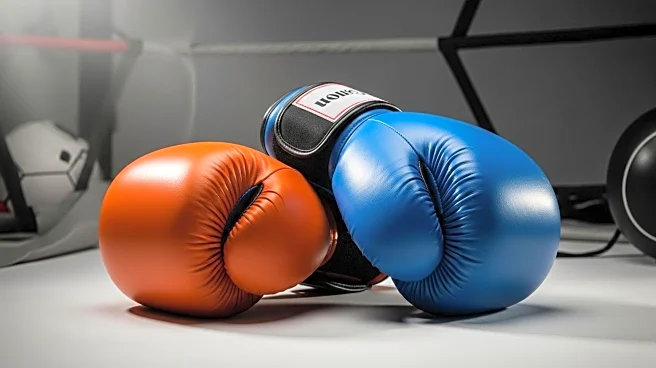What's Happening?
Olympic gold medalist Imane Khelif is contesting the decision by World Boxing to enforce gender testing for boxers, which affects her eligibility to compete. The mandate was introduced following Khelif's victory at the 2024 Paris Olympics, where she won a gold medal. The Court of Arbitration for Sport (CAS) announced that Khelif has filed an appeal against World Boxing's decision, seeking to participate in the 2025 World Boxing Championships without undergoing the test. Despite her appeal, CAS has dismissed her request to suspend the testing requirement until the case is resolved. Khelif, along with Taiwanese boxer Lin Yu-ting, has been at the center of gender eligibility debates following their Olympic successes.
Why It's Important?
The challenge by Imane Khelif highlights ongoing debates about gender testing in sports, which can have significant implications for athletes' careers and the integrity of competitions. The decision by World Boxing to mandate gender testing raises questions about fairness and privacy, impacting athletes who may face scrutiny and potential exclusion from competitions. This issue is particularly relevant in the context of increasing discussions around gender identity and sports regulations. The outcome of Khelif's appeal could set a precedent for how sports organizations handle gender eligibility, affecting athletes worldwide and potentially influencing public policy on gender and sports.
What's Next?
The Court of Arbitration for Sport will continue to review Khelif's appeal, with the potential to influence future policies on gender testing in sports. Stakeholders, including sports organizations, athletes, and advocacy groups, may respond to the case's developments, potentially leading to broader discussions and reforms in sports regulations. The decision could impact Khelif's participation in upcoming competitions, including the 2025 World Boxing Championships, and may prompt other athletes to challenge similar mandates.
Beyond the Headlines
The controversy surrounding gender testing in sports touches on ethical and legal dimensions, including athletes' rights to privacy and the definition of gender in competitive contexts. The case may contribute to long-term shifts in how sports organizations address gender identity, potentially influencing cultural perceptions and legal standards. The involvement of public figures like U.S. Vice President JD Vance and author J.K. Rowling in the debate underscores the broader societal interest and potential impact on public discourse.








